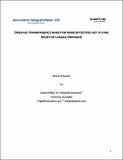Does Aid Transparency Make For More Effective Aid? A Case Study of Lusaka Province
Date
2011-09Authors
Pollen, Gabriel
Seshamani, Venkatesh
Type
Research PaperLanguage
enItem Usage Stats
76
views
views
51
downloads
downloads
Abstract
The main general hypothesis regarding aid is that it plays a critical role in fostering economic growth and development in the recipient countries. However, several empirical studies do not corroborate this hypothesis. It has been argued that aid has been largely ineffective in bringing about poverty reduction and development in the recipient countries. Some critics have debunked the current model of international aid and even advocated the complete abolition of aid by instead suggesting entrepreneurship as an alternative if Africa is to realise her dream out of poverty (see for instance, Moyo, 2009). A more pragmatic and middle-of-the-road view would be that there are several factors contributing to the ineffectuality of aid in realizing its developmental goals. It would, therefore, be more prudent to address those factors rather than abolish aid altogether, especially when there are still serious resource deficits in many developing countries to address the challenges of accelerated poverty reduction and development. Besides, not all aid has proven to be ineffective everywhere.
There are also stories of success that could provide lessons in best practice
Description
Cafod; JCTR
